The Federal Trade Commission today announced a new “Enforcement Policy Statement on Marketing Claims for Over-the-Counter (OTC) Homeopathic Drugs.” The policy statement was informed by an FTC workshop held last year to examine how such drugs are marketed to consumers. The FTC also released its staff report on the workshop, which summarizes the panel presentations and related public comments in addition to describing consumer research commissioned by the FTC.
The policy statement explains that the FTC will hold efficacy and safety claims for OTC homeopathic drugs to the same standard as other products making similar claims. That is, companies must have competent and reliable scientific evidence for health-related claims, including claims that a product can treat specific conditions. The statement describes the type of scientific evidence that the Commission requires of companies making such claims for their products.
Homeopathy, which dates back to the 1700s, is based on the theory that disease symptoms can be treated by minute doses of substances that produce similar symptoms when provided in larger doses to healthy people. Many homeopathic products are diluted to such an extent that they no longer contain detectable levels of the initial substance. According to the policy statement, homeopathic theories are not accepted by most modern medical experts.
For the vast majority of OTC homeopathic drugs, the policy statement notes, “the case for efficacy is based solely on traditional homeopathic theories and there are no valid studies using current scientific methods showing the product’s efficacy.” As such, the marketing claims for these products are likely misleading, in violation of the FTC Act.
However, the policy statement also notes that “the FTC has long recognized that marketing claims may include additional explanatory information to prevent the claims from being misleading. Accordingly, it recognizes that an OTC homeopathic drug claim that is not substantiated by competent and reliable scientific evidence might not be deceptive if the advertisement or label where it appears effectively communicates that: 1) there is no scientific evidence that the product works; and 2) the product’s claims are based only on theories of homeopathy from the 1700s that are not accepted by most modern medical experts.
The policy statement notes that any such disclosures should stand out and be in close proximity to the product’s efficacy message and might need to be incorporated into that message. It also warns marketers not to undercut a disclosure with additional positive statements or consumer endorsements reinforcing a product’s efficacy. The statement warns that the FTC will carefully scrutinize the net impression of OTC homeopathic marketing claims and that if an ad conveys more substantiation than a marketer has, it will violate the FTC Act.
The Commission vote approving the enforcement policy statement and issuance of the staff report on the Homeopathic Medicine & Advertising Workshop was 3-0.
The Federal Trade Commission works to promote competition, and protect and educate consumers. You can learn more about consumer topics and file a consumer complaint online or by calling 1-877-FTC-HELP (382-4357). Like the FTC on Facebook, follow us on Twitter, read our blogs and subscribe to press releases for the latest FTC news and resources.

